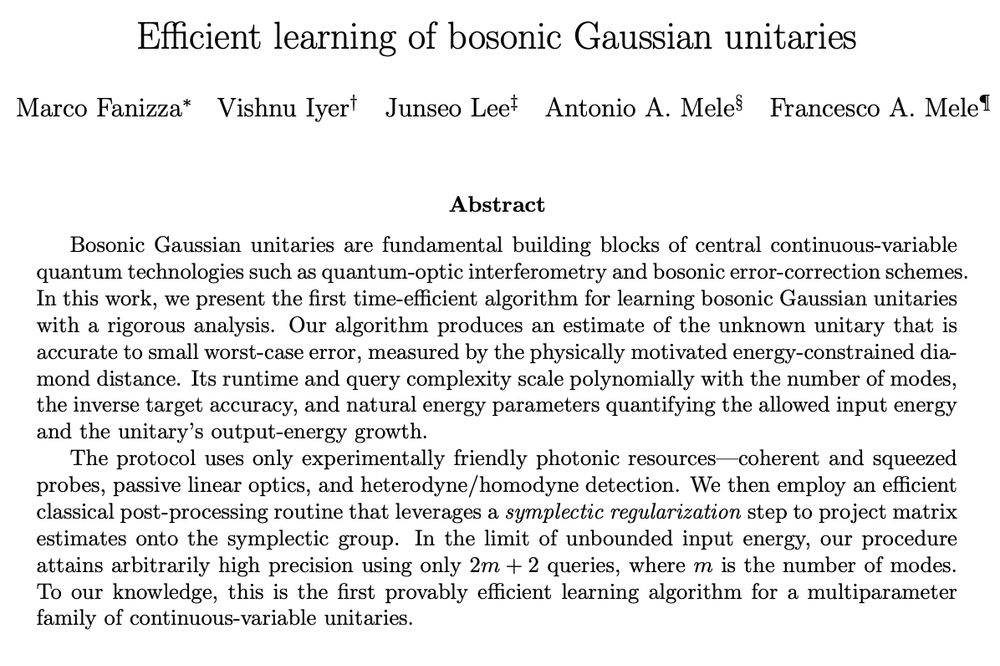- Optimising quantum data hiding arxiv.org/abs/2510.03538
- Efficient learning of CV Gaussian unitaries arxiv.org/abs/2510.05531
- Is it Gaussian? Testing CV Gaussian states arxiv.org/pdf/2510.07305

- Optimising quantum data hiding arxiv.org/abs/2510.03538
- Efficient learning of CV Gaussian unitaries arxiv.org/abs/2510.05531
- Is it Gaussian? Testing CV Gaussian states arxiv.org/pdf/2510.07305
(Italian only)
youtu.be/yzXUsDUPt8A?...

(Italian only)
youtu.be/yzXUsDUPt8A?...

(Italian only)
youtu.be/yzXUsDUPt8A?...
This prize recognises early-career researchers who advance quantum information in new directions

This prize recognises early-career researchers who advance quantum information in new directions
Today's new work tackles another natural and central question in this rapidly developing field: Given an unknown CV state, how to test whether is it Gaussian or not?
arxiv.org/pdf/2510.07305
1/

Today's new work tackles another natural and central question in this rapidly developing field: Given an unknown CV state, how to test whether is it Gaussian or not?
arxiv.org/pdf/2510.07305
1/
And indeed, when you look closely at this field, many natural and promising questions arise. For instance:
How to learn CV Gaussian unitaries?
arxiv.org/pdf/2510.05531
1/

And indeed, when you look closely at this field, many natural and promising questions arise. For instance:
How to learn CV Gaussian unitaries?
arxiv.org/pdf/2510.05531
1/
arxiv.org/pdf/2510.03538
1/

arxiv.org/pdf/2510.03538
1/
This international award recognizes early-career researchers who are advancing quantum information science and engineering in new directions!
🔗 chicagoquantum.org/2025BQCP

This international award recognizes early-career researchers who are advancing quantum information science and engineering in new directions!
🔗 chicagoquantum.org/2025BQCP
🔗 sites.google.com/sns.it/franc...
I’ll try to keep it updated with my research work.

🔗 sites.google.com/sns.it/franc...
I’ll try to keep it updated with my research work.
A new decomposition of Gaussian unitaries and new bosonic trace distance bounds (the saga of bosonic trace distance bounds never ends! 😍)
arxiv.org/abs/2504.19319
1/

A new decomposition of Gaussian unitaries and new bosonic trace distance bounds (the saga of bosonic trace distance bounds never ends! 😍)
arxiv.org/abs/2504.19319
1/
Take the covariance matrix of a pure state and count the number of symplectic eigenvalues that are strictly larger than one: this is a powerful non-Gaussian monotone — the *symplectic rank*
arxiv.org/abs/2504.19319
1/

Take the covariance matrix of a pure state and count the number of symplectic eigenvalues that are strictly larger than one: this is a powerful non-Gaussian monotone — the *symplectic rank*
arxiv.org/abs/2504.19319
1/
What is the maximum energy that you can extract from a quantum state via Gaussian unitaries only?
We solve this problem by establishing a simple, cute formula for the *Gaussian ergotropy*.
1/
arxiv.org/abs/2503.21748

What is the maximum energy that you can extract from a quantum state via Gaussian unitaries only?
We solve this problem by establishing a simple, cute formula for the *Gaussian ergotropy*.
1/
arxiv.org/abs/2503.21748
We study one-shot q communication over reasonable non-Markovian lossy Gaussian channels. To do so, we prove error bounds on the convergence rate of the *powerful* Avram-Parter's (and Szego's) theorem, which may be of independent interest in matrix analysis.
arxiv.org/abs/2503.13207

We study one-shot q communication over reasonable non-Markovian lossy Gaussian channels. To do so, we prove error bounds on the convergence rate of the *powerful* Avram-Parter's (and Szego's) theorem, which may be of independent interest in matrix analysis.
arxiv.org/abs/2503.13207
journals.aps.org/prl/abstract...
@physicists, when you compute the famous *logarithmic negativity*, you should compute our quantity instead!
1/

journals.aps.org/prl/abstract...
@physicists, when you compute the famous *logarithmic negativity*, you should compute our quantity instead!
1/


